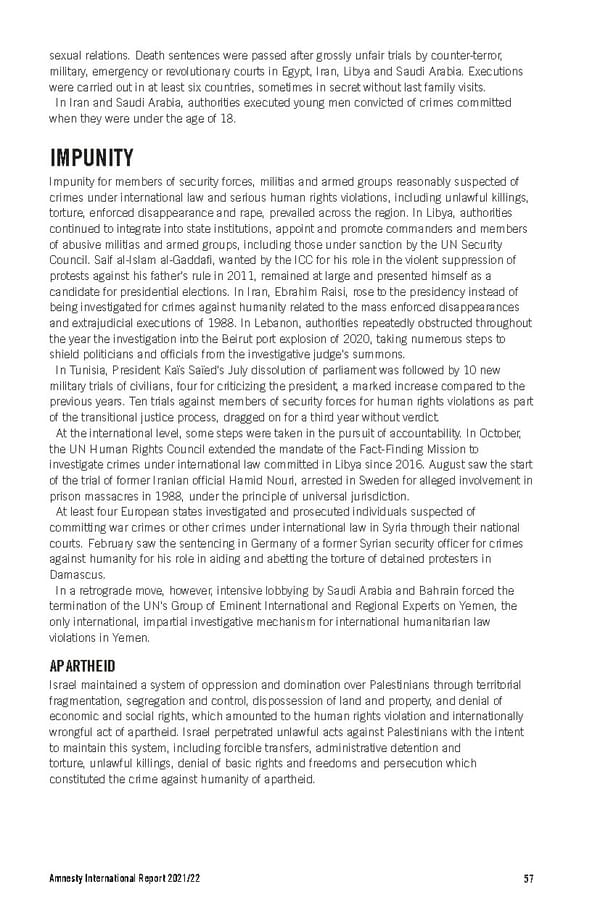sexual relations. Death sentences were passed after grossly unfair trials by counter-terror, military, emergency or revolutionary courts in Egypt, Iran, Libya and Saudi Arabia. Executions were carried out in at least six countries, sometimes in secret without last family visits. In Iran and Saudi Arabia, authorities executed young men convicted of crimes committed when they were under the age of 18. IMPUNITY Impunity for members of security forces, militias and armed groups reasonably suspected of crimes under international law and serious human rights violations, including unlawful killings, torture, enforced disappearance and rape, prevailed across the region. In Libya, authorities continued to integrate into state institutions, appoint and promote commanders and members of abusive militias and armed groups, including those under sanction by the UN Security Council. Saif al-Islam al-Gaddafi, wanted by the ICC for his role in the violent suppression of protests against his father’s rule in 2011, remained at large and presented himself as a candidate for presidential elections. In Iran, Ebrahim Raisi, rose to the presidency instead of being investigated for crimes against humanity related to the mass enforced disappearances and extrajudicial executions of 1988. In Lebanon, authorities repeatedly obstructed throughout the year the investigation into the Beirut port explosion of 2020, taking numerous steps to shield politicians and officials from the investigative judge’s summons. In Tunisia, President Kaïs Saïed’s July dissolution of parliament was followed by 10 new military trials of civilians, four for criticizing the president, a marked increase compared to the previous years. Ten trials against members of security forces for human rights violations as part of the transitional justice process, dragged on for a third year without verdict. At the international level, some steps were taken in the pursuit of accountability. In October, the UN Human Rights Council extended the mandate of the Fact-Finding Mission to investigate crimes under international law committed in Libya since 2016. August saw the start of the trial of former Iranian official Hamid Nouri, arrested in Sweden for alleged involvement in prison massacres in 1988, under the principle of universal jurisdiction. At least four European states investigated and prosecuted individuals suspected of committing war crimes or other crimes under international law in Syria through their national courts. February saw the sentencing in Germany of a former Syrian security officer for crimes against humanity for his role in aiding and abetting the torture of detained protesters in Damascus. In a retrograde move, however, intensive lobbying by Saudi Arabia and Bahrain forced the termination of the UN’s Group of Eminent International and Regional Experts on Yemen, the only international, impartial investigative mechanism for international humanitarian law violations in Yemen. APARTHEID Israel maintained a system of oppression and domination over Palestinians through territorial fragmentation, segregation and control, dispossession of land and property, and denial of economic and social rights, which amounted to the human rights violation and internationally wrongful act of apartheid. Israel perpetrated unlawful acts against Palestinians with the intent to maintain this system, including forcible transfers, administrative detention and torture, unlawful killings, denial of basic rights and freedoms and persecution which constituted the crime against humanity of apartheid. Amnesty International Report 2021/22 57
 Amnesty International Report 2021/22 Page 56 Page 58
Amnesty International Report 2021/22 Page 56 Page 58